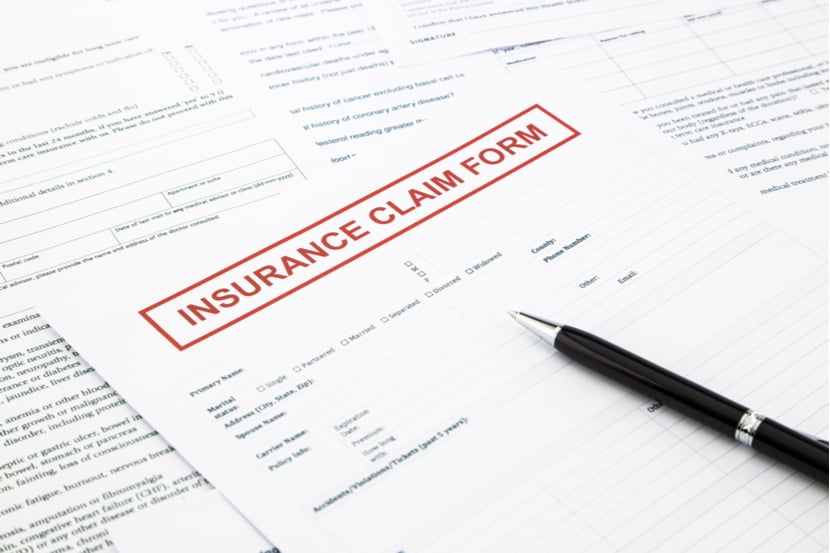It can be emotional and stressful to sort through the paperwork after someone dies. And if they had a life insurance policy, figuring out how to claim only adds to the stress. That's assuming you know that they had a life insurance policy to begin with.
We're here to help make that part of the process as easy as possible. Here's everything you need to know about making a claim on someone else's life insurance.

How do I claim on someone’s life insurance?
1. Gather the documents you need
To help speed up the process, make sure you have these documents ready:
- The deceased's personal details - Their full name, address and policy number. Insurers may also require evidence of their medical history from a GP or specialist.
- Your personal details - Your full name, contact details and relationship to the deceased.
- Death certificate - You can only get this once someone has registered the death. You usually need to send the original document to an insurer, so get multiple copies if there’s more than one life insurance policy in place.
- Life insurance policy - The insurer should have sent the life insurance policy document when it was first bought, but it's usually available online as well. If you can’t find it, you can request a replacement.
2. Contact the insurer and claim
Tell the insurer you want to make a claim and they should give you all the details you need.
You should be able to find details of the insurer on any communications between them and the policyholder. This could be an annual statement sent in the post, via email or as a welcome pack.
The best way to contact the insurer should be in these policy documents but you can also find them on the insurer’s website.
You can then file a life insurance claim and provide the necessary documents to support it.
Many insurers let you fill in the claims form online, which should help speed up the process.
How do I find out if someone had life insurance?
Have a look at their bank account and credit card statements. You should be able to find regular life insurance payments and who they were going to.
If you already have a copy of the policy, all the details should be included in the document.
If the details are out of date, take a look at the Association of British Insurers’ (ABI), which has the current contact details for all its members.
Who can make a life insurance claim?
Anyone can start the process of making a life insurance claim. But only beneficiaries can claim the payout.
Life insurance beneficiaries are the people who legally inherit a lump sum of money when the policyholder dies. This is often a family member or loved one but can also include friends, clubs and charities.
The deceased should have named the beneficiaries in the life insurance policy. They should also be clarified in the deceased's will.
How do I find out if I’m the beneficiary of a life insurance policy?
If you have the life insurance policy document, you can contact the insurer directly. They should be able to clarify who's named as the beneficiary and whether the policy is actually still running.
If you don't have the policy document, you should be able to find out if you're a beneficiary by looking at the deceased's will.
How long do I have to make a life insurance claim?
There’s no legal deadline for making an insurance claim after someone has died - you start the claims process when you're ready. But it’s generally better to do it as soon as possible. Life insurance claims can take time, especially if there are complicated circumstances.
Life insurance companies keep records for a limited time after the policyholder has died. If you don't have a copy of the life insurance policy after this time, it may be more difficult to make a claim.
How long does life insurance take to pay out?
Most life insurance companies aim to settle claims within 30 days. But there’s no set timeframe for life insurance payments as they all depend on the policy and the death.
They should give you a rough estimate of how long it might take when you make the claim. Having all the relevant documents and details in place should help speed up the process.
If there are no disputes over the circumstances of the death or the named beneficiaries, they tend to pay the money out fairly quickly. Expect to wait around a month or so.
If an investigation needs to take place or there are lots of beneficiaries, it could take longer.
How the insurance policy was written could also impact the timing of any payouts.
If the life insurance policy has been written in trust, the policy is looked after by a board of trustees. These could be the policyholder’s friends, family members or a solicitor. If it’s written in trust, this usually makes the process of life insurance payments quicker.
When might life insurance not pay out?
The reasons why a life insurance claim might be rejected vary between insurers. But in general, here are some reasons why a life insurance policy might not pay out:
- The person died because they took their own life within 12-18 months of buying the policy
- The person died because of a drug or alcohol overdose
- The person died from a pre-existing health condition that wasn't declared
- The death was caused by a high-risk activity, such as an extreme sport
- The policyholder stopped paying the insurance costs
- You're missing vital documents
- The policy term has ended
Life insurance payments generally have one of the highest rates of successful payments.
In 2022, 97% of life insurance payments were made, according to data from the ABI. The average amount of money paid for life insurance policies was £73,578.
How do I appeal if a claim is rejected?
To appeal a rejected life insurance claim, make a direct complaint to the insurer. They then have to investigate the complaint within 8 weeks.
If you've not heard from the insurer after 8 weeks or you're still unhappy with their decision, you can escalate your complaint further.
The free Financial Ombudsman Service (FOS) is there to look into your complaint independently.
They should investigate the case on your behalf. If they decide the claim should have been paid, they can order the insurer to do so. They could also order the insurer to compensate you for any expenses you’ve faced during the process.
Can I claim on my life insurance policy before I die?
There are some situations where you might be able to claim on your life insurance policy before you die. But it depends on:
- The policy
- The insurer
- The specific circumstances
Usually this happens if you're diagnosed with a terminal illness and have less than 12 months to live.
There are many other types of policies that are designed to pay out before you die. These include critical illness cover, which pays out if you're diagnosed with a specific illness or condition, as listed on the policy.







